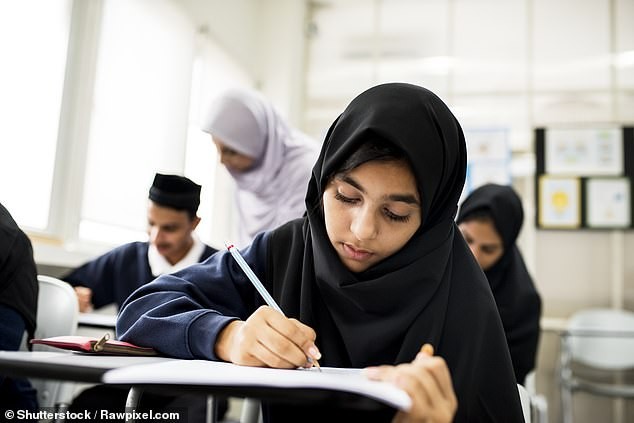Austria bans headscarves for girls under 14, calling it oppression that fuels shame as young Muslims rise to 12,000
The Austrian government is moving to ban girls under the age of 14 from wearing Islamic headscarves in school, arguing they are a sign of oppression. State Secretary Jorg Leichtfried and Integration Minister Claudia Plakolm presented the details of the ban on Thursday. "A headscarf on an 11-year-old girl is and remains a sign of oppression," Plakolm said. "Girls develop feelings of shame, they get a distorted body image, an unstable sense of self-worth." The draft law, which is set to be debated in Parliament soon, is to apply from the 2026/2027 school year, the minister added. The prospect of the ban was first floated in 2019, but Plakolm stressed that the situation today is 'completely different' as the number of Muslim girls under the age of 14 has jumped from 3,000 to 12,000. The ban is set to apply across all schools, both public and private, and covers classrooms, playgrounds, gymnasiums and school sports fields. It does not, however, apply to third-party school events.

In This Article:
Two-stage rollout explained: awareness in February 2026 and penalties in September 2026
Two-stage rollout is planned. The first step is an awareness phase which is due to begin in February 2026, where schools, parents and children will be fully briefed on the new rules. The sanctions are then scheduled to come into effect at the start of the 2026/2027 school year, where penalties for violating the ban will also be imposed. The prospect of the ban was first floated in 2019, but Plakolm stressed that the situation today is 'completely different' as the number of Muslim girls under the age of 14 has jumped from 3,000 to 12,000. The ban will apply across all schools, both public and private, and covers classrooms, playgrounds, gymnasiums and school sports fields.

Enforcement details how the ban will be policed and penalties imposed
If a girl under the age of 14 is seen wearing a hijab or burqa at school, she and her parents will be called in for a meeting with the school's administration. Do you agree with the headscarf ban? If they still do not follow the ban, there will be a second meeting with the relevant District School Authority. However, further violations could see the local youth welfare agency becoming involved, and in extreme cases, parents can face fines of between £130 to £700, or face up to two weeks in prison. The initial draft of the ban included fines of up to £880.

Reactions, legal history and political context
During a cabinet meeting in September, when asked why pupils can wear a cross but not a headscarf, Plakolm argued the headscarf is a 'symbol of oppression.' She said the state's duty is to ensure girls grow up free to make their own choices, stressing that schools must be safe spaces for development where nothing should hinder that. 'Girls should be able to grow up freely, visibly, and self-confidently in our country,' she wrote in a post on X at the time. 'That is why we have decided to ban the children's headscarf. It will be accompanied by a package of measures for raising awareness among parents, empowerment for girls, and consistent work with boys,' she added. Leichtfried added that although the debate surrounding the headscarf ban for children is 'complex', it allows the government to carry out a key objective of 'protecting children and young people as much as possible from external pressures or assigned roles'. He claimed that external dress codes could 'severely impair the development of girls'. Yannick Shetty, an NEOS parliamentary group leader, added: 'I don't want an 11-year-old to have to worry for even a second about whether her hair is properly covered.' The Islamic Religious Community in Austria (IGGO) criticised the initial decision, noting that all efforts beforehand to work towards a constitutional solution were ignored. 'Headscarf ban is symbolic politics at the expense of children and democracy,' it said in a statement in September. Austria's top court struck down a previous attempt to ban headscarves in schools in 2019, saying it violated constitutional legislation on religious freedom. But members of the current government, a coalition of the OVP, the Social Democratic Party of Austria and the liberal NEOS party, are confident that the ban will be upheld this time around. 'For us, the right of parents to religiously educate their children ends where girls are oppressed and self-determined upbringing is not possible,' Plakolm said. 'We protect girls, not moral standards. We protect their right to childhood. We protect their freedom to be visible without shame. To achieve this, we are creating clear, fair, and well-founded rules. Every girl in Austria should grow up free, visible, and self-determined. And that is precisely what we are taking an important step towards today'.

What this means going forward in the Austrian headscarf debate
Austria's government argues the policy is about protecting girls from external pressures and ensuring safe spaces for development, accompanied by a package of measures for raising awareness among parents and empowering girls. Critics warn that such bans risk infringing religious freedom and entrench social divisions.


